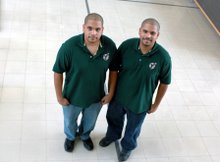Said twice (in the excerpts below), standby for some real structural changes (economic, global, political, social, & technological) to come. Essentially, we will have to re-prioritize away from tactical economic maneuvering to more strategic economic maneuvering. That is, less consumptive spending on useless things that does not add real value to our overall lives and more strategic spending that creates a sustainable future for not just ourselves but our kids too.
As is the case in troubling times, we will be going back to basics. And this will be a rennaissance of sorts. We will find many expressing a nostalgia of things of old that worked well. However, we need to keep an eye to the future in applying "old world" principles. If we keep staring in the rearview mirror we may miss the turns in the road and run off the road. But going back to "old world" principles, they are timeless and apply as much today as it always had in the past. So, when we move away from it and things go awry, we have to return to it in order to make sense of what has gone wrong.
But what are we leaving behind for our kids? A mess? A good question to be asking yourselves during this time of introspection is: What will be my legacy? And use this in making decisions as we move forward. Our kids' future demand this of us!
So to bring this discussion full circle, we will return to basics, to "old world" principles that we've departed from. And lets return to "old world" craftmanship a world where workmanship and pride flourish on the basis of principles. This is truly sustainable.
Finally, an evolving theme is increasing risk due to our more inter-connectedness globally. Whole industries and parts of others are being decimated and exposing risk that at times seem fleeting. We will have to be quicker at deciphering these risks and work to mitigate them -- not just for tomorrow but the day after tomorrow. I think this will be a major part of the structural re-alignment I mentioned earlier. And a good example of this would be the Airline industry. They were hurting recently due to high fuel prices. Many of them, essentially all except one, were exacting substantial losses. As a result, they had to respond by raising prices. Only one airline didn't really have to and that was Southwest Airlines. This was in large part due to it's hedging. Think of how much things would have been different by relating this to the excerpts below and the rest of what I wrote about. And watch how this plays out. You will find that you are understanding the Change that was much talked about in recent days.
Excerpts:
With unemployment now soaring across the U.S., said Stephen Roach, the chairman of Morgan Stanley Asia, Americans — “the most over-extended consumer in world history” — can no longer buy so many Chinese exports. We need to save more, invest more, consume less and throw out most of our credit cards to bail ourselves out of this crisis.
It’s good advice. China is not going to rescue us or the world economy. We’re going to have to get out of this crisis the old-fashioned way: by digging inside ourselves and getting back to basics — improving U.S. productivity, saving more, studying harder and inventing more stuff to export. The days of phony prosperity — I borrow cheap money from China to build a house and then borrow on that house to buy cheap paintings from China to decorate my walls and everybody is a winner — are over.
Sunday, December 21, 2008
Subscribe to:
Post Comments (Atom)




No comments:
Post a Comment